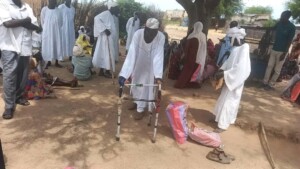Sudan reports 14 new Covid-19 deaths – call to observe social distancing
On Tuesday, the Sudanese Ministry of Health reported 170 new cases of coronavirus, including 14 deaths, bringing the official total number of cases in Sudan to 4,146 with 184 Covid-19 related deaths reported to date.
 Instructions to prevent infection with coronavirus (Sudan Ministry of Health)
Instructions to prevent infection with coronavirus (Sudan Ministry of Health)
On Tuesday, the Sudanese Ministry of Health reported 170 new cases of coronavirus, including 14 deaths, bringing the official total number of cases in Sudan to 4,146 with 184 Covid-19 related deaths reported to date.
Prof Suleiman Saleh, a well-known endoscopy specialist and the owner of the Adil Hospital in Khartoum, called on the authorities to reduce the hours of the lockdown during the daytime while obliging the people to wear masks.
In a statement on Wednesday, he also called for the strict implementation of the measures of social distancing with police supervision.
Sterilisers should be provided for symbolic prices and the culture of washing hands intensified, he said.
Prof Saleh pointed to the negative economic and medical effects of the lockdown. “Patients find no place for treatment due to the stoppage of a large number of private clinics and hospitals, as well as their fear of Covid-19.”
He pointed to the failure of the comprehensive ban to control the Corona pandemic due to the failure of citizens to adhere to the ban, as well as the failure of the authorities to implement the comprehensive ban in some areas.
Prof Saleh deplored “the ignorance and negligence with which citizens deal with the disease and their performance of the Eid prayer, which was stopped at the Noble Sanctuary of Makkah due to disease.”
Special police unit
The Sudan Central Doctors Committee has called on the Sovereign Council to expedite the passage of the law for the protection of medical personnel, explaining that there are four days left for the deadline for its approval.
In a statement, the Ministry of Interior Affairs also called for the formation of a special police unit for protection of health facilities, explaining that “the law alone is not sufficient, and the presence of such a police unit would guarantee the stability of service provision”.
The committee said that “the law will represent a qualitative shift in the path of stability in providing medical services in hospitals” and that it would transform hospitals into “places immune against attacks and provocations”.
Radio Dabanga’s editorial independence means that we can continue to provide factual updates about political developments to Sudanese and international actors, educate people about how to avoid outbreaks of infectious diseases, and provide a window to the world for those in all corners of Sudan. Support Radio Dabanga for as little as €2.50, the equivalent of a cup of coffee.












 and then
and then